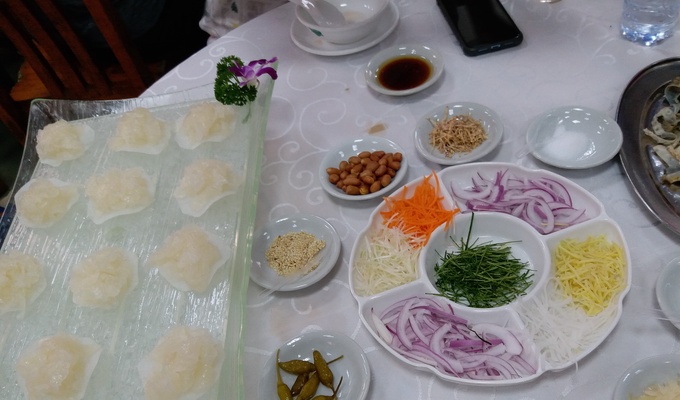Yusheng, yee sang or yuu sahng, or Prosperity Toss, also known as lo sahng is a Cantonese-style raw fish salad. It usually consists of strips of raw fish, mixed with shredded vegetables and a variety of sauces and condiments, among other ingredients. There is also a vegetarian version of this dish, where the fish is replaced with soy "fish", which resembles salmon. Yusheng literally means "raw fish" but since "fish " is commonly conflated with its homophone "abundance ", Yúshēng is interpreted as a homophone for Yúshēng meaning an increase in abundance. Therefore, yusheng is considered a symbol of abundance, prosperity and vigor.
The dish originated from China, although the dish in its modern form was created and popularised in the 1960s amongst the Singaporean Chinese community by chefs Lau Yoke Pui, Tham Yui Kai, Sin Leong and Hooi Kok Wai, together known as the "Four Heavenly Kings" in the Singapore restaurant scene. Subsequently, its consumption has been associated with Chinese New Year festivities in Singapore.
Today, the common form of yusheng is the qicai yusheng (七彩鱼生; "seven-coloured raw fish salad") served in local restaurants during the Chinese New Year period. Also referred to as facai yusheng (发财鱼生; "prosperity raw fish salad") or xinnian yusheng (新年鱼生; "Chinese New Year raw fish salad"). The recipe generally includes ingredients such as shredded white and green radish and carrots, ginger slices, onion slices, crushed peanuts, pomelo, pepper, essence of chicken, oil, salt, vinegar, sugar and more.
Yusheng during Chinese New Year is a cultural activity for the Chinese population in Singapore as well as in Indonesia, Malaysia and Hong Kong over the last few decades.
